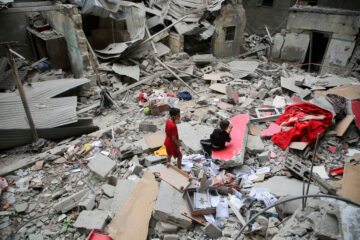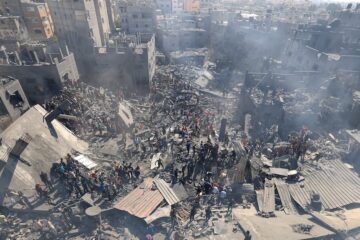Iran billionaire tycoon Zanjani sentenced to death for corruption
Iran has sentenced billionaire tycoon Babak Zanjani, reportedly one of the country\’s richest men, to death, convicting him of corruption after a long trial on accusations he fraudulently pocketed $2.8 billion.
A justice official announced the punishment Sunday, noting that Zanjani, who became notorious for finding ways to channel hard currency from oil sales during the sanctions-ridden era of president Mahmoud Ahmadinejad from 2005 to 2013, could appeal.
Zanjani rose to prominence after sanctions imposed on the Islamic republic\’s banks as punishment for its nuclear programme hit the country\’s finances hard.
Having taken commissions, he said he was at all times working with the knowledge and backing of Ahmadinejad\’s government and he boasted in media interviews of his skills and wealth amassed by managing to subvert the banking restrictions.
He said he did so using a web of companies in various countries including the United Arab Emirates, Turkey and Malaysia, selling millions of barrels of Iranian oil.
But he was arrested in December 2013, three months after current President Hassan Rouhani took office, having pledged to crack down on corruption.
Zanjani, 41, was convicted of fraud and economic crimes and must repay money to the state as well as face the death penalty, judiciary spokesman Gholam Hossein Mohseni-Ejeie said.
The trial was public, a rarity for such a major case in Iran, and two other accused were also convicted of "corruption on earth", the most serious offence in the Islamic republic, meaning they too will face the death penalty.
"The preliminary court has sentenced these three defendants to be executed, as well as paying restitution to the plaintiff," said Mohseni-Ejeie, adding this was the oil ministry.
They must also pay a "fine equal to one fourth of the money that was laundered", the spokesman said, without specifying the sum.
Zanjani had denied wrongdoing, insisting the only reason the money had not been paid to the oil ministry was that sanctions had prevented a planned transfer from taking place. That claim was disputed in court.
The case follows repeated declarations from Rouhani\’s government that corruption and the payment of illegal commissions thrived under Ahmadinejad\’s rule. Other trials are ongoing.
Zanjani told the media that in return for commissions he was tasked with circumventing sanctions to get money back to Iran. He did so at a time of record high oil prices, meaning tens of billions of dollars were at stake.
In October last year, however, Rouhani\’s oil minister Bijan Zanganeh hit out at the use of middlemen such as Zanjani.
Iranian media have put the tycoon\’s fortune as high as $13.5 billion, with public opinion split on whether he was indeed helping the government or enriching himself at the country\’s expense.
Zanganeh and other officials said the latter was the case.
Speaking after Iran concluded a nuclear deal with world powers in July, paving the way for increased foreign activity in Iran\’s energy sector, the oil minister urged investors to deal directly with the government and avoid third parties.
"We despise the corrupt parasites that want to suck the nation\’s blood even in this situation," Zanganeh said to loud applause at an industry event in the capital while Zanjani\’s trial was under way.
"I recommend foreign companies stay away from these corrupt individuals" who know nothing but "deceitfulness".
Zanjani was among Iranian individuals blacklisted under US and European sanctions.
The nuclear deal saw a large part of these sanctions lifted at the beginning of 2016 in exchange for Tehran curbing its nuclear programme.
Defending the nuclear talks in 2014 before the deal came about, Rouhani said "a small, fringe group is very angry about it because they will suffer losses" and referred to Zanjani as such a person.
In parliamentary elections last month, the president secured his goal of a more moderate parliament, signalling strong public support for the nuclear accord and creating an opening for domestic reforms.
As of 2015, Iran ranked first in the world in natural gas reserves and fourth in proven crude oil reserves, according to energy giant BP.
SOURCE: AFP
[do_widget_area inner_adsbar]











